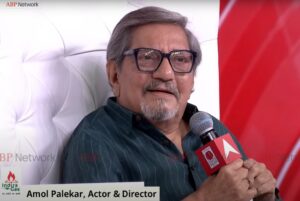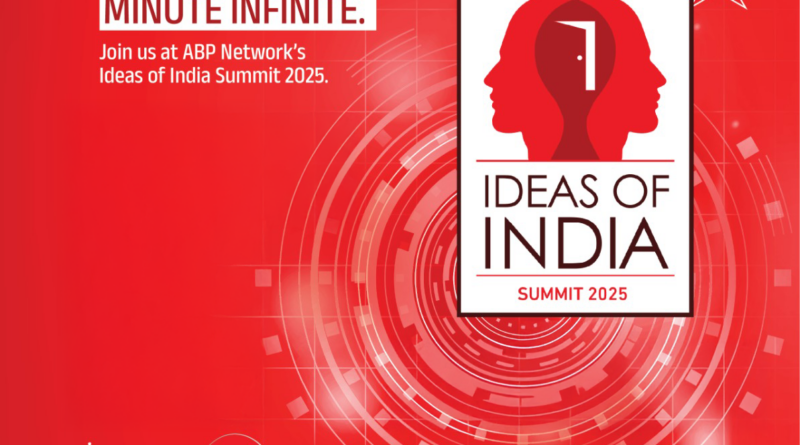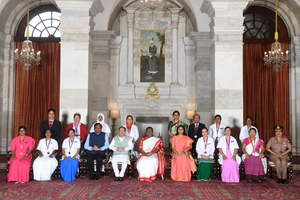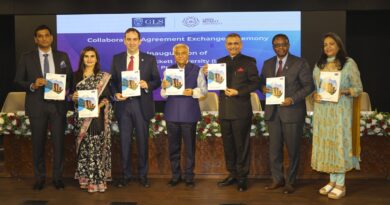Amol Palekar at ABP Network’s Ideas of India 2025: ‘A film is more than just its earnings
BILKULONLINE
Mumbai, Feb 21: “Actors have more social responsibility because people look up to them. There was a trend that movie only meant for entertainment. But art or movies cannot be mindless entertainment”, remarked acclaimed veteran theatre artist and actor Amol Palekar at ABP Network’s Ideas of India 2025.
On being asked about his views on today’s movies not capturing important social issues, Amol Palekar said, “Shouldn’t media cover these topics? If you see on any channel, 90% of topics covered by media is political news, as if there’s nothing else in our lives. We are stuck in a maze of who said what. Media should take responsibility to cover other aspects of our lives which can help us to become better human beings.”
On being asked about the topics he has covered, Amol Palekar said, “As a director, the movies that I have made are intended to make films which awake the society. I made a movie called Dhoosar on a woman with Alzheimer’s disease about 10 years ago. The Alzheimer’s society sought non-commercial rights to showcase it around the world.”
He further added, “I made a bilingual movie on same sex relationships when Brokeback Mountain happened. We had asked for an Adult certificate because it was a sensitive topic. However, we didn’t receive censor certificate by Marathi cinema. I made a movie called Daayraa in 1996 which didn’t see theatrical release in India. It was about a movie where a man wants to cross-dress as a woman and a lady who wants to cross-dress as a man. It was selected as top 10 movies all over the world in that year and had won Grand Prix Award.”
Sharing his views for the economy around movies and decline of Hindi cinema, Amol Palekar said, “Why do we link good movies with its business? Is our understanding limited to the business a movie makes? A film is more than the money that it has earned.”
On being asked about the new ways of making movies on mobile phones, Amol Palekar said, “We all have mobile phones in our hands, but with what perspective we are capturing and what we want to convey is missing.”

Commenting on the infiniteness of core art forms, Amol Palekar said, “From theatre to movies, then television, social media, and other platforms – every new medium was seen as a threat to its predecessor. Yet there will never be an end to core art forms like theatre.”
Speaking about the beginning of his journey in the session ‘Fifty Years On – Art, Activism, and Acting’, Amol Palekar said, “When I received a story by Mannu Bhandari from Basu Chatterjee, I was taken by surprise because how the 1.5-page story can be made into a 2 hour film? Also, the story had no villain or drama. In fact, in the story the hero never confesses his love to the lead actress. On asking my doubts to Basu Chatterjee, he asked me if I was willing to be part of such a project. That’s how the journey of Rajnigandha and my film career became.”
Sharing his views on his public perception, Amol Palekar said, “I was labelled as the boy next door by media. I think it was so because it was the time when Rajesh Khanna’s era hadn’t ended and the era of Angry Young Man had started off. I didn’t fit those description. But I think common people could relate with me more and my first three movies were silver jubilee.”
Speaking about his early training in acting, Amol Palekar said, “In theatre, I learned how to project my voice to make it audible for the person sitting in the last row at a time when we didn’t have mics.”
The ABP Network’s Ideas of India 2025, centred on the theme ‘Humanity’s Next Frontier’, will convene thought leaders and innovators to explore the challenges and opportunities in India’s ascendance in a rapidly changing world. In the face of climate change, geopolitical conflicts, and technological advancements like AI, the summit delved into India’s role as both an ancient civilisation and a demographic powerhouse in shaping the future. The two-day summit brings together a confluence of ideas by global thought leaders, intellectuals, and change-makers covering transformative possibilities in science, medicine, social contracts, and global leadership, with experts from diverse fields offering bold visions of a better, more sustainable world for all.


